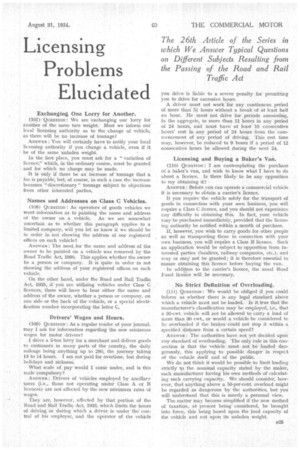Licensing Problems Elucidated
Page 35

If you've noticed an error in this article please click here to report it so we can fix it.
Exchanging One Lorry for Another.
(107) QUESTION: We are exchanging our lorry for another of the same tare weight. Must we inform our local licensing authority as to the change of vehicle, as there will be no increase of tonnage?
ANswER: You will certainly have to notify your local licensing authority if you change a vehicle, even if it be of the same unladen weight.
In the first place, you must ask for a "variation of licence" which, in the ordinary course, must be granted and for which no charge may be made.
It is only if there be an increase of tonnage that a fee is payable, but, of course, in such a case the increase becomes "-discretionary" tonnage subject to objections from other interested parties.
Names and Addresses on Class C Vehicles.
(108) QUESTION As operators of goods vehicles we want information as to painting the name and address of the owner on a vehicle. As we are somewhat uncertain as to whether this paragraph applies to a limited company, will you let us know if we should be in order in not showing the address of our registered. offices on each vehicle?
ANSWER: The need ,for the name and address of the owner to be painted On a vehicle was removed by the Road Traffic Att, 1930. This applies whether the owner be a person or company. It is quite in order in not showing the address of your registered offices on each vehicle.
On the other hand, under the Road and Rail Traffic Act, 1933, if you are utilizing vehicles under. Class C licences, these will have to bear either the name and address of the owner, whether a person or company, on one side or the back of the vehicle, or a special identification number incorporating the letter C.
Drivers' Wages and Hours.
(109) QUESTION: As a regular reader of your journal. may I ask for information regarding the new minimum wages for motor drivers?
" I drive a 5-ton lorry for a merchant and deliver gaols to customers in many parts of the country, the daily mileage being anything up to 280, the journey taking 13 to 14 hours. I "am not paid for overtime, but during holidays and siCkness.
What scale of pay would I conic under, and is this scale compulsory?
ANSWER: Drivers of vehicles employed by ancillary users (i.e., those not operating under Class A or licences) are not affected by the new minimum rates of wages.
They are, however, affected by that portion of the Road and Rail Traffic Act, 1933, which limits the hours of driving or during which a driver is under the" control of his employer, and the operator of the vehicle you drive is liable to a severe penalty for permitting you to drive for excessive hours.
A driver must not work for any continuous period of more than hours without a break of at least half an hour. He must not drive for periods amounting, In the aggregate, to more than 11 hours in any period of 24 hours, and must have at least 10 consecutive hours' rest in any period of 24 hours from the commencement of any period of driving. This rest time may, however, be reduced to 9 hours if a period of 12 consecutive hours be allowed during the next 24.
. Licensing and Buying a Baker's Van.
(110) QUESTION: I am contemplating the purchase of a baker's van, and wish to know what I have to do about a licence, is there likely to be any opposition to my obtaining it?
ANSWER: Before you can operate a commercial vehicle it is necessary to obtain a carrier's licence.
If you require the vehicle solely for the transport of goods in connection with your own business, you will require a Gass C licence, and you should not experience any difficulty in obtaining this. In fact, your vehicle may be purchased immediately, provided that the licensing authority be notified within a month of purchase.
If, however, you wish to carry goods for other people as well as transporting those in connection with your own business, you will reqnire a Class B lkence. Such an application would be subject to opposition from interested parties (hauliers, railway companies, etc.), and may or may not be granted; it is therefore essential to ensure obtaining this licence before buying the van, In addition to the carrier's licence, the usual Road Fund licence will be necessary,
No Strict Definition of Overloading.
(111) QUESTION: We would be obliged if you could inform us whether there is any legal standard above which a vehicle mast not be loaded. Is it true that the manufacturer's classification may be employed, i.e., that a 30-cwt. vehicle will not be allowed to carry a load of more than 30 cwt, or would a vehicle be considered to ba overloaded if the brakes could not stop it within a specified 'distance from a certain speed?
ANSWER: The authorities have not yet decided upon any standard of overloading. The only rule in this connection is that the vehicle must not be loaded dangerously, this applying to possible danger in respect of the vehicle itself and of the public.
We do not think it would be possible to limit loading strictly to the nominal capacity stated by the maker, each manufacturer having his own methods of calculating such carrying capacity. We should consider, however, that anything above a 50-per-cent. overload might be regarded as dangerous by the authorities, but you will understand that this is merely a personal view.
The matter may become simplified if the new method of taxation, at present being considered, be brought into force, this being based upon the load capacity of the vehicle and not upon its unladen weight.




















































































